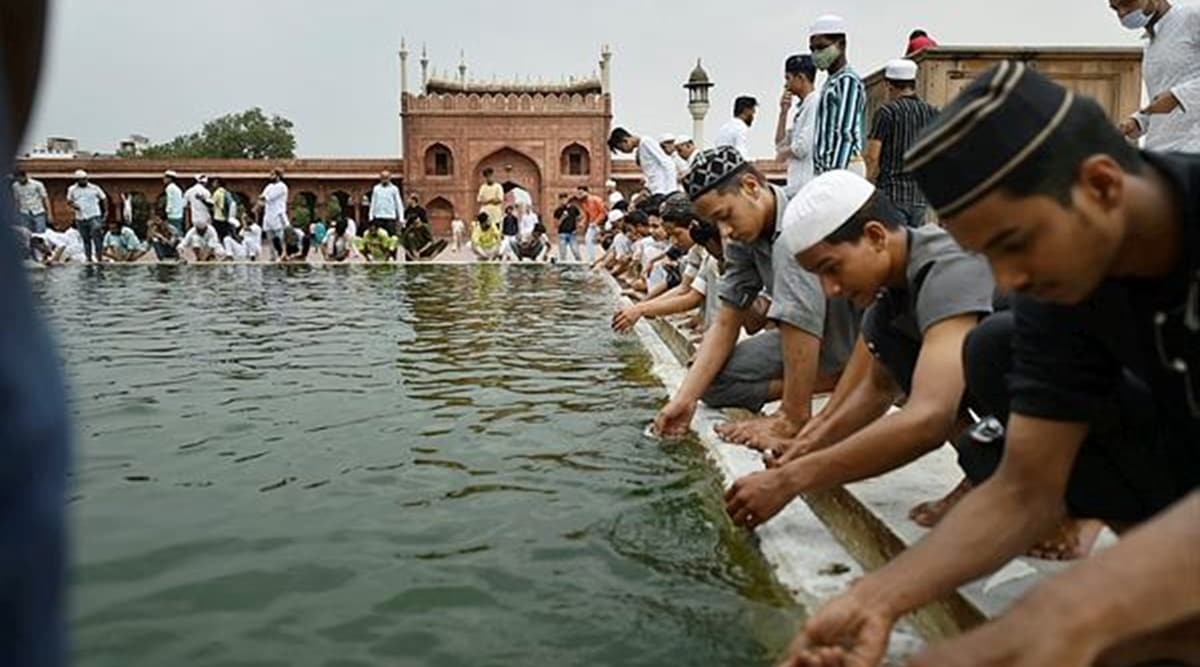April 18, 2021 5:24:42 pm
 Muslim devotees wash their hands before prayers during the ongoing holy fasting month of 'Ramadan', at Jama Masjid in New Delhi, Friday, April 16, 2021. (PTI Photo/Arun Sharma)
Muslim devotees wash their hands before prayers during the ongoing holy fasting month of 'Ramadan', at Jama Masjid in New Delhi, Friday, April 16, 2021. (PTI Photo/Arun Sharma) Written by Upendra Kaul
The month of Ramazan or Ramadan is the ninth month of the Islamic calendar observed internationally by Muslims as a month of fasting, prayer, reflection and community. The annual observance of Ramzan is regarded as one of the five pillars of Islam and lasts twenty-nine to thirty days from one sighting of the crescent moon to the next. Fasting from sunrise to sunset is for an adult Muslims obligatory.
Exempted from this are those who are acutely or chronically sick, travelling, the elderly, those breastfeeding, diabetic, or menstruating ladies. I remember my earlier days of Kashmir when during this holy month our Muslim neighbours, including the children, were really excited and looking forward to it. So were we, the Pundits, looking at the joyous atmosphere prevailing in the neighbourhood.
Our elders had briefed us about the significance of this month for our neighbours. The pandemic poses an enormous challenge for Muslims during this month. One has to comply with the religious duties as well as be a responsible citizen and avoid transmitting COVID.
There is no evidence till date to suggest that fasting can increase susceptibility to COVID. If anybody gets symptoms, a doctor should be consulted and there is religious permission to break the fast. The social events which are a part of this month are best done virtually or just with the people you live with.
In-person events, especially those that are crowded and held indoors with poor ventilation, vastly increase the threat of the spread of COVID-19. Such events should not be organised this year. Large events and gatherings should be avoided because many young people who are infected with COVID-19 do not even know that they are positive. They are capable of spreading this potentially fatal virus infection to others.
For this reason, the safest way to celebrate is to do so at home. Small events should be done with fewer attendees, preferring only household members. An outdoor venue is preferable or else open all the windows and doors for ventilation. We need to provide masks, hand sanitisers or soap and water, tissues, bins with disposable liners and closed lids.
Distance markers at two arm lengths or six feet is a must. It is important to talk or announce to all the guests about the safety measures before the beginning of the event. It is strongly advocated that persons more than 60 years of age or with underlying conditions like high blood pressure, diabetes and heart disease should stay away from these events. Observe all the COVID appropriate measures during the event if you must go.
During this month it is important to drink plenty of water, and not to smoke, eat junk or highly spiced food cooked in fat with a high salt intake. Consume plenty of juicy fruits during Sahar and Iftar. Sleep early and sleep well during the permissible hours. Offer special prayers for the sick, alongside messages of hope and comfort. Communicate with them virtually using social digital platforms. Use digital technology for Zakat, avoid crowded Iftar parties and instead distribute pre-packaged boxes of eatables.
Vaccinations must continue. The International Islamic Fiqh Academy has ruled that Zakat money should be used to buy and distribute COVID-19 vaccines to those who can’t afford it. Prominent Fatwa bodies, such as Al-Azhar Al-sharif, have ruled that being vaccinated for COVID-19 will not invalidate the fast. This is because it is delivered through injection and not from a natural opening.
The vaccines do not contain pig or human derivatives and are permissible in Islam, meaning thereby that the current vaccines are Halal. Even those devotees who have had both doses of the vaccination need to observe all the COVID protocols because no vaccine is 100 per cent effective and it only boosts the immunity to prevent very serious infection. The transmission from an infected vaccinated person has the same virulence.
Finally, the safest way to worship during Ramzan is at home. Perform wudu at home, taking a personal prayer rug and wearing a mask at all times. Pray in an outdoor area if possible, keeping at least one metre distance between people, and greetings that avoid physical contact like nodding or placing your hand over your heart and observing COVID appropriate behaviour. Last, but not the least, limit the amount of time you spend inside the mosque.
The writer is a cardiologist and social scientist and a Padma Shri
- The Indian Express website has been rated GREEN for its credibility and trustworthiness by Newsguard, a global service that rates news sources for their journalistic standards.

